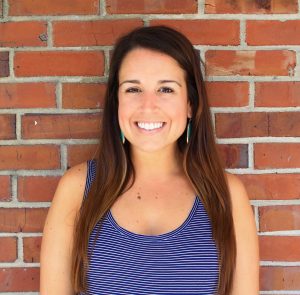This post was written by NCTE member Shelby M. Boehm.
I started taking swim classes this summer. I’ve spent a lot of time in open water, but I jumped at the opportunity to learn competitive swim strokes and how to properly dive, through classes at my local university pool.
Swim classes are the most recent time I’ve been a beginner. I’ve learned piano, sewing, candle-making, and tennis from professional instructors; zine-making, block printing, and creative writing from community artists; and nearly every needlework craft from my friend Paige.
As a teacher myself, I find something fascinating about seeing how others approach the teaching of their craft. I’ve gained ideas for my own teaching practice from watching others, such as a new way to explain the writing process to my tenth graders after I attended a nature-based painting class or the time I found inspiration from cross-stitch to explain the concept of literacies to preservice teachers. Between the skills and instruction, swim classes have offered a new perspective as I prepare for the upcoming school year. With this in mind, I offer what I’m learning about teaching from swim lessons in hopes that it guides your work as a teacher.
Be gentle with your students, but also yourself.
Even though I considered myself a competent swimmer before taking swim classes, I truly felt like a “fish out of water” the first time my instructor asked me to try one of the competitive swim strokes. Similarly, each new school year brings new everything even for experienced teachers: students, curriculum, current events, and the list goes on. Even if you’ve taught a lesson before or worked with similar students, give yourself the space to recognize that the experience ahead is new, and you’re learning what it means to do this school year or specific class for the first time. As my swim instructor mentioned during one of my lessons, we’re going for progress here, not perfection. Be gentle with yourself and your students as you all enter what is perhaps a familiar setting yet a new iteration.
Asking for help or rest doesn’t mean you’re unsuccessful.
It took me a long time to learn how to do controlled breathing while swimming laps. During freestyle swimming, I kept craning my neck at an uncomfortable angle that impacted my entire movement in the pool. My instructor noticed the poor breathing form happened more the further we were into a class, meaning I had exhausted my efforts and was falling back into a bad habit. As the school year ramps up, it’s easy to enter into a pattern of autopilot where you can’t recognize your own tiredness. To this point, the many institutional systems that put pressure on teachers can make asking for help or rest feel uncomfortable or impossible. Going into this year, make a plan and follow through with it when you recognize that your teaching form isn’t at its full capacity. Building up your stamina, whether swimming or teaching, is an important part of the work.
Be willing to think that your approach is not the only way.
I was inspired by my swim instructor’s responsive teaching during a lesson about diving. With the instructions given, I was worried I would hit my head when entering the pool. My instructor paused and said, “Let me see if I explained that right.” He then got into the position, demonstrated the dive following his own instructions, and then talked through where I might be confused or worried about the movements. To me, his instruction was a master class in learning alongside your students and engaging their struggles and fears. A willingness to talk through the diving form made all the difference in my confidence and learning as a beginner.
Besides learning a new skill, I enjoy the process of remembering beginning. Being a beginner at anything is challenging. To be a beginner can feel uncomfortable and even frustrating. I’ve certainly been guilty of wondering how I’m not further along at learning a skill that others make seem so easy. Further, once we’re competent in something, it can be difficult to remember the often long, challenging road it took to get to proficiency. For me, beginning makes visible the emotions and processes of being a learner. And as I support students as beginners—whether in teaching, writing, or any other skill—I want to encourage them to dive in.
It is the policy of NCTE in all publications, including the Literacy & NCTE blog, to provide a forum for the open discussion of ideas concerning the content and the teaching of English and the language arts. Publicity accorded to any particular point of view does not imply endorsement by the Executive Committee, the Board of Directors, the staff, or the membership at large, except in announcements of policy, where such endorsement is clearly specified.

Shelby Boehm is a doctoral candidate at the University of Florida where she studies humanizing pedagogies. Prior to doctoral studies, she taught high school English in Florida. She can be reached at smbufl@gmail.com or on Twitter at @TeamBoehm.
